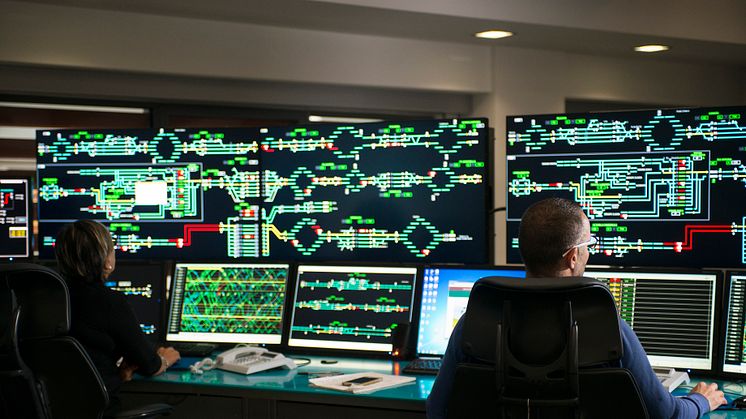
Press release -
Hitachi Rail helps modernize Egypt’s most important railway line connecting Cairo to Alexandria
- Hitachi Rail installs Centralized Traffic Control (CTC) system to manage the 19 stations on the Cairo-Alexandria line
- With 54 million passengers per year and more than 200 kilometers in length, it is the busiest railway line in Egypt
- The completion of the project will increase the speed of the trains by 40 km/h, reducing the journey time between the two cities to only two and a half hours.
Cairo: Hitachi Rail has completed a new milestone in the process of modernizing Egypt's railway infrastructure with the delivery of the Cairo Traffic Control Center (TCC) to Egyptian National Railways. The CTC marks the completion of an ambitious contract as part of the railway infrastructure transformation plan promoted by the Egyptian Ministry of Transport.
The state-of-the-art Centralized Traffic Control (CTC) system has been implemented to manage the 19 stations that make up the Cairo-Alexandria line. Along with this infrastructure, level crossings have been modernized, enhancing safety for road and rail users; and new technical buildings, including main and secondary towers, have been constructed.
With the initial contract signed in 2013, over the course of more than a decade, the agreement has been extended to more than 100 million euros of investment. During this time, the old mechanical and electrical signalling on the main lines has been replaced with a modern electronic system, including digital interlockings, new signals and motorized drives. A fixed and mobile telecommunications system has also been installed, as well as technology that allows the driver to communicate with the operations manager in case of emergency or failure.
Thanks to these systems, the line's operational capacity has been safely increased by up to 40%. Trains will be able to reach speeds of up to 160 km/h, making it possible to complete the Cairo-Alexandria route in just two and a half hours. This improvement will also enable double the number of trains per day, increasing the volume of rail traffic. It is estimated that the maximum capacity of the line could reach 286 trains, compared to the current 140.
“Our team has played a critical part in modernizing this vital line, making every day travel safe, seamless and more efficient for the citizens in Egypt”, commented Bruno Teixeira, General Project Manager of Hitachi Rail in Egypt.
It is also a step forward in terms of freight transport. A progressive increase in the number of freight trains is planned to reach 15 daily convoys in 2030 and 50 in 2060. The goal is to transport 18,400 containers per year by rail, reducing the use of road transport and avoiding the emission of up to 965,000 tons of CO2 over a 30-year period, thus contributing to the decarbonization of the national transport system.
Modernization of Egypt's National Railways
The Egyptian railway network, inaugurated in 1854 with a first section between Alexandria and the governorate of Kafr el Sheikh, is one of the oldest in the world. Today it has more than 10,000 kilometers of track and annually transports around 500 million passengers, making it an essential infrastructure for the country's mobility.
However, the Egyptian rail system has lagged behind road transport, which, coupled with several recent operational problems, prompted the government to launch an ambitious modernization plan in 2017. The goal is to transform the network into a strong, safe, efficient and multimodal system. Egyptian National Railways aims to offer the best rail service on the continent by 2050.
Topics
About Hitachi Rail
Hitachi Rail is committed to driving the sustainable mobility transition and has a clear focus on partnering with customers to rethink mobility. Its mission is to help every passenger, customer and community enjoy the benefits of more connected, seamless and sustainable transport.
With revenues of over €7bn and 24,000 employees across more than 50 countries, Hitachi Rail is a trusted partner to the world’s best transport organisations. The company's reach is global, but the business is local - with success built on developing local talent and investing in people and communities.
Its international capabilities and expertise span every part of the urban, mainline and freight rail ecosystems – from high quality manufacturing and maintenance of rolling stock to secure digital signalling, smart operations and payment systems.
Hitachi Rail, famous for Japan's iconic high speed bullet train, draws on the digital and AI expertise of Hitachi Group companies to accelerate innovation and develop new technologies. Hitachi Group is present in 140 countries with over 270,000 employees and global revenues of €58.16bn / ¥9,7 bn.
For more information, visit hitachirail.com


